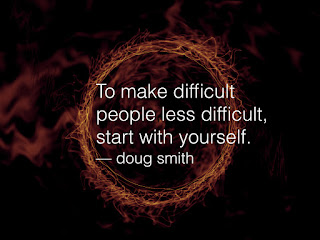Do you know a difficult person? Of course you do. We all do. Some people just make life harder than it needs to be. It's that person who misses the deadline, every time. It's the person who won't return your messages. It's the person who rolls their eyes when you speak in a meeting. You know one or more of them, I'm sure.
We can't fix them. Even high performance leaders can't fix difficult people because people are not processes or machines. We make funny noises. We stutter and moan. We grunt at customers when we should be patient and kind. But that's not how it needs to be.
We can make a difference. As leaders, we don't need to surrender to a bad day or even a bad moment. We're here to serve. Even difficult behaviors can spark better behavior of our own - habits we develop to better serve each other and so to also serve ourselves.
By taking care of ourselves. By taking those deep breaths when we need them. By developing a sense of perspective that tells us there is always something bigger and that this current situation is likely much smaller than it feels. We'll get thru this, we'll help that difficult person feel better about themselves and then about us, too. Maybe. Instead of taking difficult behavior personally, we can personally see that we do our best.
To make difficult people less difficult, start with yourself. That is something you can control.
-- doug smith
I help people develop leadership with clarity, courage, creativity, and compassion. You can schedule an appointment to talk about how we might work together here.


Comments
Post a Comment